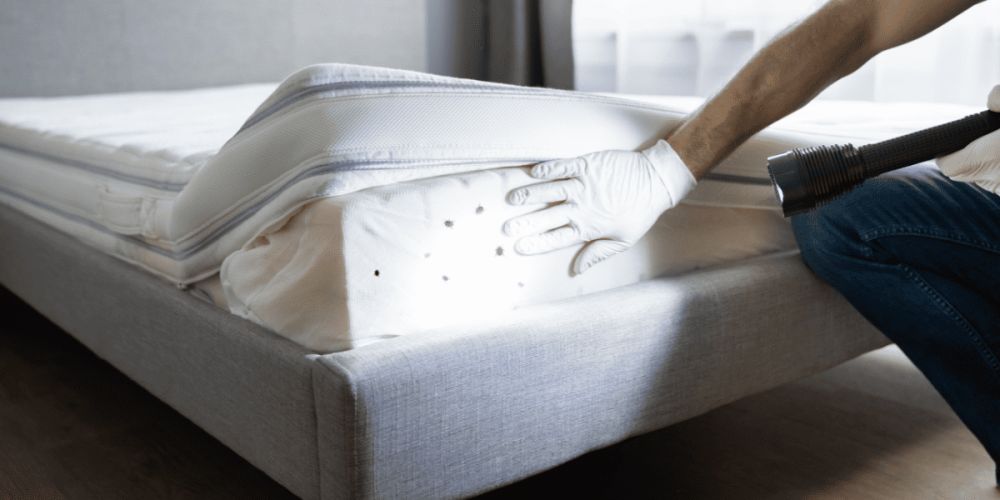Bed bugs are a common and persistent problem for homeowners in Florida and around the world. These tiny, blood-sucking pests can quickly infest your home, leading to discomfort, anxiety, and sleepless nights. If you’re dealing with a bed bug infestation, don’t panic; help is at hand!
At JD Smith Pest Control, we specialize in effective bed bug treatments that will rid your home of these unwelcome guests for good. Our pest experts will tell you how to get rid of bed bugs once and for all.
Identifying a Bed Bug Infestation
Before diving into the treatment options, it’s essential to confirm the presence of bed bugs. Bed bugs are notorious for their ability to hitch a ride and infest new locations, making it crucial to be vigilant and aware of potential contact points. Popular ways people come into contact with bed bugs include:
- Travel: Staying in hotels, motels, or vacation rentals can expose travelers to bed bugs. These pests often hide in luggage, clothing, or personal belongings, making it easy for them to be unknowingly transported back home.
- Used Furniture: Second-hand furniture, especially mattresses and upholstered items, can harbor bed bugs. Bringing infested furniture into your home can lead to an infestation.
- Shared Living Spaces: Dormitories, apartments, and shared housing arrangements increase the risk of bed bug transmission. These pests can move between units through cracks, electrical outlets, or wall voids.
- Public Transportation: Bed bugs can sometimes be found in public transportation, such as buses, trains, and airplanes. They may infest seats or luggage storage areas.
- Laundry Facilities: Bed bugs can spread in communal laundry rooms if infested clothing or bedding is transferred from one machine to another.
- Visitors: Guests or visitors who unknowingly bring bed bugs with them can introduce an infestation to your home.
Identifying an infestation early is key to preventing it from spreading and becoming a more significant problem. Here are some signs to watch out for:
- Bite Marks: Bed bug bites often appear in clusters and can cause itching and discomfort.
- Visible Bed Bugs: Adult bed bugs are reddish-brown, about the size of an apple seed, and can be seen crawling on your mattress or bedding.
- Tiny Blood Stains: If you notice tiny bloodstains on your sheets or pillowcases, it may be a sign of crushed bed bugs.
- Small Dark Spots: Bed bug excrement looks like small, dark spots or smears on your mattress or furniture.
- Musty Odor: Some people describe the smell of a bed bug infestation as musty or sweet.
If you suspect you have bed bugs after noticing signs like unexplained bites or finding small, reddish-brown bugs in your bedding, it’s essential to promptly treat the infestation. Now is not the time for DIY treatment when it comes to dealing with bed bugs. These resilient pests can quickly multiply and become a more significant problem if not properly addressed.
Effective Bed Bug Treatment
Once you’ve confirmed a bed bug infestation, it’s crucial to take immediate action to eliminate these pests from your home. Here are the steps to get rid of bed bugs once and for all:
1. Contact a Professional: While DIY treatments may provide temporary relief, they often fail to address the root of the problem. Hiring a professional pest control company like JD Smith Pest Control is the most effective way to eliminate bed bugs. Our experienced technicians have the knowledge, tools, and expertise to tackle bed bug infestations of all sizes.
2. Professional Inspection: A thorough inspection of your home is essential to identify all infested areas. Bed bugs can hide in cracks, crevices, and even electrical outlets. To prepare your home for a bed bug inspection, declutter and inform the inspector of suspected infestation areas to ensure a comprehensive and accurate examination.
3. Treatment Options: Professional pest control companies offer various treatment options, including:
- Heat Treatment: Using specialized equipment, we raise the temperature in your home to levels that are lethal to bed bugs.
- Chemical Treatments: Safe and effective insecticides are applied to infested areas.
- Steam Treatment: High-temperature steam is used to kill bed bugs and their eggs on contact.
- Vacuuming and Cleaning: Thoroughly vacuuming and cleaning infested areas helps remove bed bugs and their eggs.
JD Smith Pest Control specializes in eliminating these tiny pests with chemical treatment. This process can be done on multiple scales, whether you have a small infestation and just need some spots treated, or if you have a massive outbreak and need your entire house fumigated for them, JD Smith Pest Control can help you get rid of any bed bug outbreaks you face.
4. Prevent Reinfestation: To prevent bed bugs from returning, follow these preventive measures:
- Encase Mattresses and Box Springs: Use bed bug-proof encasements to trap any remaining bed bugs.
- Regular Cleaning: Vacuum your home regularly, and wash bedding and curtains in hot water.
- Reduce Clutter: Clutter provides hiding places for bed bugs, so declutter your home.
- Inspect Second-Hand Items: Be cautious when bringing used furniture or clothing into your home.
Dealing with a bed bug infestation can be stressful, but with the right approach, you can get rid of these pests once and for all. At JD Smith Pest Control, we have the expertise and experience to provide effective bed bug treatments tailored to your specific needs. Don’t let bed bugs disrupt your life any longer; contact us today for a bed bug-free home and peaceful nights of sleep.



